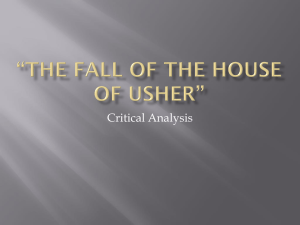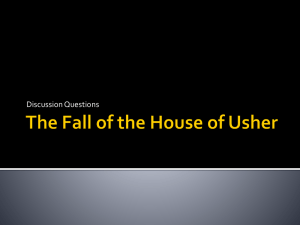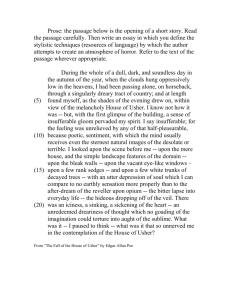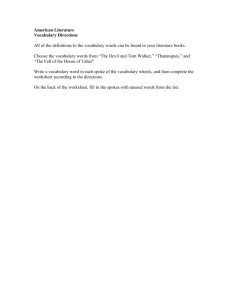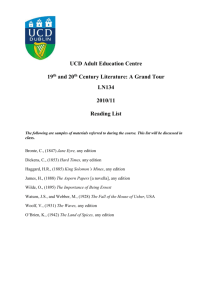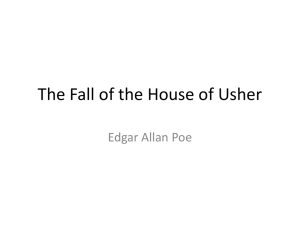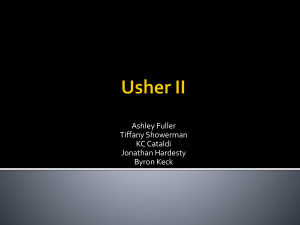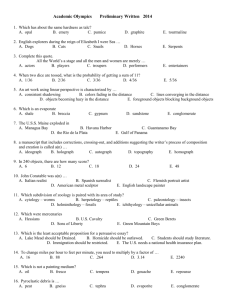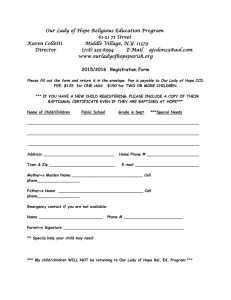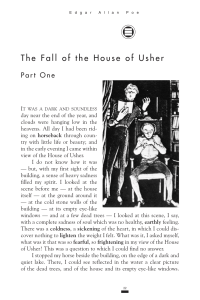10 Poe
advertisement
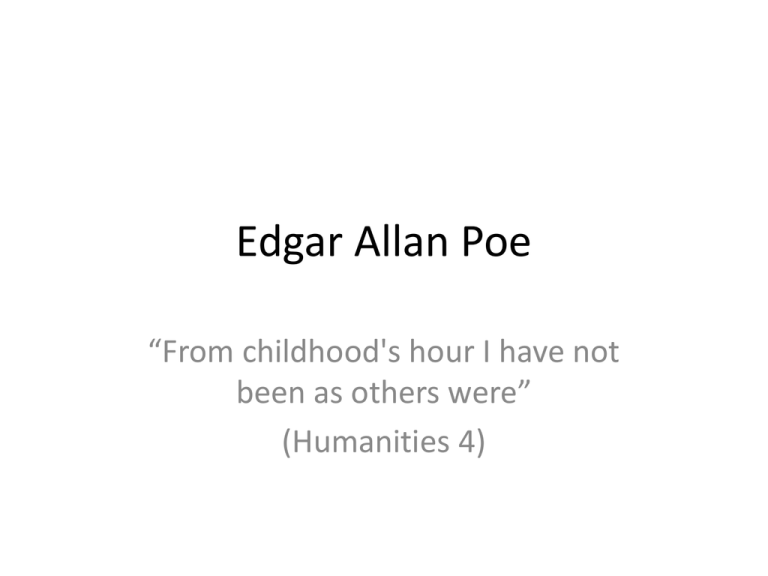
Edgar Allan Poe “From childhood's hour I have not been as others were” (Humanities 4) Edgar Allan Poe • 1809-1849 • Poet, critic, journalist – Gothic, science fiction, inventor of detective genre • Among first Americans to attempt to live solely as a writer • Married 13 year old cousin Virginia Clemm in 1835 – Viriginia died of tuberculosis, 1847 • Mysterious death 1849 2 Alone From childhood's hour I have not been As others were; I have not seen As others saw; I could not bring My passions from a common spring. From the same source I have not taken My sorrow; I could not awaken My heart to joy at the same tone; And all I loved, I loved alone. 3 Alone Then- in my childhood, in the dawn Of a most stormy life- was drawn From every depth of good and ill The mystery which binds me still: From the torrent, or the fountain, From the red cliff of the mountain, From the sun that round me rolled In its autumn tint of gold, From the lightning in the sky As it passed me flying by, From the thunder and the storm, And the cloud that took the form (When the rest of Heaven was blue) Of a demon in my view. 4 The Haunted Palace Once a fair and stately palace— Spirits moving musically Radiant palace—reared its head. To a lute's well-tunèd law, In the monarch Thought's Round about a throne, where dominion— sitting [...] (Porphyrogene!) Banners yellow, glorious, golden, In state his glory well befitting, On its roof did float and flow; The ruler of the realm was seen. (This—all this—was in the olden Time long ago) [...] Wanderers in that happy valley Through two luminous windows saw 5 The Haunted Palace And all with pearl and ruby glowing Was the fair palace door, Through which came flowing, flowing, flowing And sparkling evermore, A troop of Echoes whose sweet duty Was but to sing, In voices of surpassing beauty, The wit and wisdom of their king. Through the red-litten windows, see Vast forms that move fantastically To a discordant melody; While, like a rapid ghastly river, Through the pale door, A hideous throng rush out forever, And laugh—but smile no more. But evil things, in robes of sorrow, Assailed the monarch's high estate (Ah, let us mourn, for never morrow Shall dawn upon him, desolate!); [...] And travelers now within that valley, 6 The House of Usher • I had learned, too, the very remarkable fact that the stem of the Usher race, all time-honored as it was, had put forth, at no period, any enduring branch; in other words, that the entire family lay in the direct line of descent, and had always, with very trifling and very temporary variation, so lain. – it was this deficiency, perhaps, of collateral issue, and the consequent undeviating transmission, from sire to son, of the patrimony with the name, which had, at length, so identified the two as to merge the original title of the estate in the quaint and equivocal appellation of the "House of Usher"—an appellation which seemed to include, in the minds of the peasantry who used it, both the family and the family mansion. 7 The House of Usher • The House – “I looked upon the scene before me—upon the mere house, and the simple landscape features of the domain—upon the bleak walls— upon the vacant eye-like windows—upon a few rank sedges—and upon a few white trunks of decayed trees—with an utter depression of soul which I can compare to no earthly sensation more properly than to the after-dream of the reveler upon opium—the bitter lapse into every-day life—the hideous dropping off of the veil.” • Roderick – “His voice varied rapidly from a tremulous indecision (when the animal spirits seemed utterly in abeyance) to that species of energetic concision—that abrupt, weighty, unhurried, and hollow-sounding enunciation—that leaden, self-balanced, and perfectly modulated guttural utterance, which may be observed in the lost drunkard, or the irreclaimable eater of opium, during the periods of his most intense excitement.” 8 • “No portion of the masonry had fallen; and there appeared to be a wild inconsistency between its still perfect adaptation of parts, and the crumbling condition of the individual stones. In this there was much that reminded me of the specious totality of old woodwork which has rotted for years in some neglected vault, with no disturbance from the breath of the external air. – Beyond this indication of extensive decay, however, the fabric gave little token of instability. Perhaps the eye of a scrutinizing observer might have discovered a barely perceptible fissure, which, extending from the roof of the building in front, made its way down the wall in a zigzag direction, until it became lost in the sullen waters of the tarn.” • “Its evidence—the evidence of the sentience [of the house]—was to be seen, he said (and I here started as he spoke), in the gradual yet certain condensation of an atmosphere of their own about the waters and the walls. The result was discoverable, he added, in that silent, yet importunate and terrible influence which for centuries had molded the destinies of his family, and which made him what I now saw him—what he was.” 9 Hypochondria & Melancholy • “To an anomalous species of terror I found him a bounden slave. ‘I shall perish,’ said he, ‘I must perish in this deplorable folly. Thus, thus, and not otherwise, shall I be lost. I dread the events of the future, not in themselves, but in their results. I shudder at the thought of any, even the most trivial, incident, which may operate upon this intolerable agitation of soul. I have, indeed, no abhorrence of danger, except in its absolute effect—in terror. – In this unnerved—in this pitiable condition—I feel that the period will sooner or later arrive when I must abandon life and reason together, in some struggle with the grim phantasm, Fear.”’ • “I learned, moreover, at intervals, and through broken and equivocal hints, another singular feature of his mental condition. He was enchained by certain superstitious impressions in regard to the dwelling which he tenanted, and whence, for many years, he had never ventured forth” 10 • He admitted, however, although with hesitation, that much of the peculiar gloom which thus afflicted him could be traced to a more natural and far more palpable origin—to the severe and long-continued illness—indeed to the evidently approaching dissolution—of a tenderly beloved sister, his sole companion for long years, his last and only relative on earth. – "Her decease," he said, with a bitterness which I can never forget, "would leave him (him the hopeless and the frail) the last of the ancient race of the Ushers." While he spoke, the lady Madeline (for so was she called) passed slowly through a remote portion of the apartment, and, without having noticed my presence, disappeared. 11 • “The disease of the lady Madeline had long baffled the skill of her physicians. A settled apathy, a gradual wasting away of the person, and frequent although transient affections of a partially cataleptical character, were the unusual diagnosis.” – “One evening, having informed me abruptly that the lady Madeline was no more, he stated his intention of preserving her corpse for a fortnight (previously to its final interment) in one of the numerous vaults within the main walls of the building. • The worldly reason, however, assigned for this singular proceeding, was one which I did not feel at liberty to dispute. The brother had been led to his resolution, so he told me, by consideration of the unusual character of the malady of the deceased, of certain obtrusive and eager inquiries on the part of her medical men, and of the remote and exposed situation of the burial ground of the family.” 12 “Sympathies of a scarcely intelligible nature” • “A striking similitude between the brother and sister now first arrested my attention; and Usher, divining, perhaps, my thoughts, murmured out some few words from which I learned that the deceased and himself had been twins, and that sympathies of a scarcely intelligible nature had always existed between them. – Our glances, however, rested not long upon the dead—for we could not regard her unawed. The disease which had thus entombed the lady in the maturity of youth, had left, as usual in all maladies of a strictly cataleptical character, the mockery of a faint blush upon the bosom and the face, and that suspiciously lingering smile upon the lip which is so terrible in death.” 13 • “‘Oh, whither shall I fly? Will she not be here anon? Is she not hurrying to upbraid me for my haste? Have I not heard her footstep on the stair? Do I not distinguish that heavy and horrible beating of her heart? Madman!’—here he sprang furiously to his feet, and shrieked out his syllables, as if in the effort he were giving up his soul—’Madman! I tell you that she now stands without the door!’” – “Then without those doors there did stand the lofty and enshrouded figure of the lady Madeline of Usher. There was blood upon her white robes, and the evidence of some bitter struggle upon every portion of her emaciated frame. For a moment she remained trembling and reeling to and fro upon the threshold—then, with a low, moaning cry, fell heavily inward upon the person of her brother, and in her violent and now final death-agonies, bore him to the floor a corpse, and a victim to the terrors he had anticipated.” • Anticipated? 14 • “Suddenly there shot along the path a wild light, and I turned to see whence a gleam so unusual could have issued; for the vast house and its shadows were alone behind me. The radiance was that of the full, setting, and blood-red moon, which now shone vividly through that once barely discernible fissure, of which I have before spoken as extending from the roof of the building, in a zigzag direction, to the base. – While I gazed, this fissure rapidly widened—there came a fierce breath of the whirlwind—the entire orb of the satellite burst at once upon my sight—my brain reeled as I saw the mighty walls rushing asunder—there was a long tumultuous shouting sound like the voice of a thousand waters—and the deep and dank tarn at my feet closed sullenly and silently over the fragments of the ‘House of Usher.’” 15 Masque of the Red Death • “But the Prince Prospero was happy and dauntless and sagacious. When his dominions were half depopulated, he summoned to his presence a thousand hale and light-hearted friends from among the knights and dames of his court, and with these retired to the deep seclusion of one of his castellated abbeys. This was an extensive and magnificent structure, the creation of the prince's own eccentric yet august taste.” – “They resolved to leave means neither of ingress or egress to the sudden impulses of despair or of frenzy from within. The abbey was amply provisioned. With such precautions the courtiers might bid defiance to contagion. The external world could take care of itself. In the meantime it was folly to grieve, or to think. The prince had provided all the appliances of pleasure.” • “All these and security were within. Without was the ‘Red Death.’” 16 • “It was in this apartment, also, that there stood against the western wall, a gigantic clock of ebony. Its pendulum swung to and fro with a dull, heavy, monotonous clang; and when the minute-hand made the circuit of the face, and the hour was to be stricken, there came from the brazen lungs of the clock a sound which was clear and loud and deep and exceedingly musical, but of so peculiar a note and emphasis that, at each lapse of an hour, the musicians of the orchestra were constrained to pause, momentarily, in their performance, to harken to the sound; and thus the waltzers perforce ceased their evolutions; and there was a brief disconcert of the whole gay company” – “and then, after the lapse of sixty minutes, (which embrace three thousand and six hundred seconds of the Time that flies,) there came yet another chiming of the clock, and then were the same disconcert and tremulousness and meditation as before.” 17 • “Even with the utterly lost, to whom life and death are equally jests, there are matters of which no jest can be made. The whole company, indeed, seemed now deeply to feel that in the costume and bearing of the stranger neither wit nor propriety existed. The figure was tall and gaunt, and shrouded from head to foot in the habiliments of the grave. – The mask which concealed the visage was made so nearly to resemble the countenance of a stiffened corpse that the closest scrutiny must have had difficulty in detecting the cheat. And yet all this might have been endured, if not approved, by the mad revellers around. But the mummer had gone so far as to assume the type of the Red Death. His vesture was dabbled in blood — and his broad brow, with all the features of the face, was besprinkled with the scarlet horror.” 18 • “There was a sharp cry — and the dagger dropped gleaming upon the sable carpet, upon which, instantly afterwards, fell prostrate in death the Prince Prospero. Then, summoning the wild courage of despair, a throng of the revellers at once threw themselves into the black apartment, and, seizing the mummer, whose tall figure stood erect and motionless within the shadow of the ebony clock, gasped in unutterable horror at finding the grave cerements and corpse-like mask which they handled with so violent a rudeness, untenanted by any tangible form” – “And now was acknowledged the presence of the Red Death. He had come like a thief in the night. And one by one dropped the revellers in the blood-bedewed halls of their revel, and died each in the despairing posture of his fall. And the life of the ebony clock went out with that of the last of the gay. And the flames of the tripods expired. And Darkness and Decay and the Red Death held illimitable dominion over all.” 19
